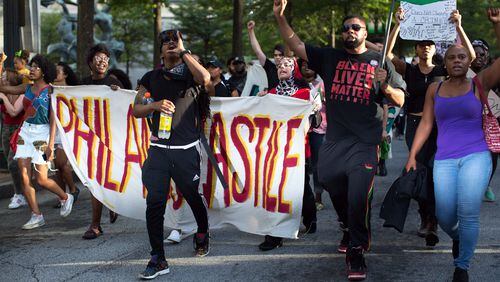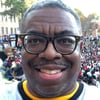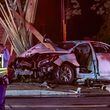Since Jan. 1, 13 Georgians have been killed in shootings involving police officers. All of the investigations are either still pending or have been presented to the jurisdiction’s district attorney with no disposition.
In January, 26-year-old Israel Rodriguez was shot to death on I-75 at Delk Road in Cobb County after exchanging gunfire with state troopers following a 10-mile high-speed chase.
In February, officers responded to a call that 25-year-old Joseph Noel had assaulted his wife. He was shot by a Commerce Police officer after ignoring orders to show his hands, shielding them with insulation and yelling: “Boom! Boom!”
Cin Lam Mung was walking down a neighborhood street holding a live chicken and a piece of metal that closely resembled a machete. He was shot after refusing orders from DeKalb County Police officers to empty his hands.
Most recently, 22-year-old Deravis Caine Rogers was fleeing the scene of an attempted robbery when officers said they fired on the car he was driving after he refused to stop.
- Marlon Walker
There were four things that Atlanta’s Mayor Kasim Reed’s father made sure he and his three brothers clearly understood about driving and dealing with the police.
• Put everything in the seat next to you, so it can be accessed easily and clearly.
• Put and keep both hands on the steering wheel when stopped.
• Always address the officer as “sir,” or “Ma’am.”
• Always get permission to do anything, like go in your pocket, or even to remove your hands from steering wheel.
“I’m 47-years-old and you see how I didn’t have to struggle remember that,” Reed said Thursday. “That is how often my father stressed that to us.”
A day after the second black man in a week was shot and killed by police officers, from Louisiana to Minnesota, cracks are beginning to show in the black community. Metro Atlanta civic leaders and thousands of people on social media are saying it is not the anger that grew out of Ferguson and Baltimore – that has passed.
Hopelessness is now settling in.
“I have a heavy heart,” Reed said at the groundbreaking of a new swimming pool in the city of Atlanta, one of the goals of which will be to provide a safe environment for kids. “I don’t think any black man that I know is stunned about what has happened. Prior to being mayor, I was stopped by police routinely.”
On July 5, in Baton Rouge, Alton Sterling, who was selling CDs in front of a neighborhood store, was shot at least twice by police officers. As he lay dying, a police officer can be seen on video removing what looks like a gun from Sterling’s right pocket.
Sterlings death and the video of it, touched a nerve in the black community, setting off a wave of social media discussions.
Which is why, some people say, it was almost unfathomable that a day later, another black man was killed by police. This time in Minneapolis, when Philando Castile was shot and killed after his car was stopped for a broken tail light. As he sat bloody and dying, his fiance broadcast his death live on Facebook as her daughter cried and consoled her in the background.
“Anytime you see somebody lose their life, it is bewildering,” said Cassandra Jones, who has been the chief of the Union City Police Department for six months. “When somebody dies, it means somebody was unsafe. And when it is a wrongful death, it is worse.”
Khadijah Diggs, an Atlanta engineer, said she is fed up with incidents of killings of African Americans by police.
“Nothing is going to change until people feel like they have nothing to lose,” said the mother of six boys and four girls. “People are afraid of losing material things or being judged by their peers who aren’t African American. They have to forget about all of that. The only people who can save African Americans are African Americans.”
Capturing these incidents on mobile devices and then sharing them have become standard practice since the video of the beating of Rodney King in Los Angeles in 1991. It has only intensified over the last two years amid high profile incidents that are now easily shared on social media.
But some wonder if the videos are enough to stop the shootings.
“Black men being gunned down is not new. What is new is that it is now being taped,” Reed said. “But after the incidents are videotaped, there seems to be a cheapening of lives of black people. And officers walking away or charges being dropped.”
Ron Clark, the noted educator, acknowledged that white privilege plays a major role in many of these instances.
“My heart breaks when I think how the beautiful and strong students I work with are basically one bullet away from becoming a #hashtag,” he wrote in a trending Facebook post.
Atlanta Police Chief George Turner, like many Americans, woke up Thursday to the news of the second killing, Castile’s.
He said he also awoke to a barrage of text messages from his daughter about what was being said about police officers and departments on social media.
“When I look at these incidents I am disturbed, like any human,” Turner said. “I implore our community to judge us on our own worth to build relationships. We have got to find a way to communicate with the community. I am confident that the few issues you see do not reflect the majority of the officers who do the job every day.”
On Thursday afternoon at the Carter Center, the Rev. Markel Hutchins — in a previously scheduled event — launched his “One Congregation One Precinct,” a proposed partnership between the clergy and police departments.
“This is an effort to build bridges between the community, law enforcement and congregations,” Hutchins said. “Our community has to come together.”
More than 250 people attended the meeting.
But with a room full of faith leaders and the heads of several major metro police departments, the general topic of local crime and violence naturally turned to the spate of national shootings of black men.
“There are quite a few everyday injustices that take place. We have to own those,” said College Park Police Chief Keith Meadows. “We have to make sure that we are training our officers so that when they go out they have a greater level of respect. This is just the first step to a greater level of understanding.”
Ken Vance, executive director of the Peace Officers Standards and Training Council of Georgia, took the podium as if he were at a pulpit. And like a pastor, he repeated the refrain, “I’m tired,” to describe the state of what he is seeing in law enforcement.
He ripped police officers who he said didn’t care about the communities they served.
“Damn that. Help somebody. Stand up and help somebody,” Vance said. “We’ve got to change the way we do law enforcement. We got to teach people how to talk to people again. How to treat people mentally ill, again. You are there — it says it on your cars — ‘to protect and serve.’ I am tired of watching videos on these dag-burn things.”
Shelia Poole contributed to this article.
About the Author




/cloudfront-us-east-1.images.arcpublishing.com/ajc/P7DYBH6TO7FEKG4SUXQQKADRXE.jpg)


